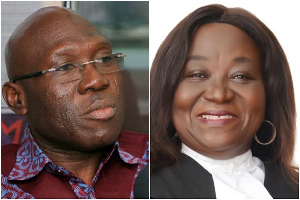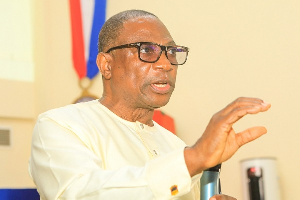Part 2
I am grateful to the numerous readers who sent me mails commenting on the previous article. All comments have been taken in good faith. In this part, I will discuss how our culture has negatively affected and continue to affect domestic savings and capital formation and why our political decision makers often have wrong priorities.Culture and Savings in Ghana:
We read in development literature about poverty and savings, the generalized opinion seems to suggest that, people who live on the margin or on the periphery have difficulty in saving. True as this may be, it is equally true that no people on earth equate consumption to productivity, because if they do, savings then will be zero, investment from domestic sources will be zero and hence growth will be equally zero or only from foreign capital. This suggests that, in Ghana, domestic savings is positive, no matter how small. The questions we all need to answer are these; why is savings so small in Ghana? What is the nature of savings in Ghana? And who at all save in Ghana?Historically, the average Ghanaian has valued the present more than the future, so only extraordinary huge returns on savings could induce him to postpone his consumption now for the future, but returns on savings have until recently been traditionally low, discouraging people from saving. This is purely an economic argument. But traditionally, the Ghanaian is not used to the banking system which is of recent origin and tended to save his/her extra wealth in kind which of course was not a problem. The problem now is that, with the advent of the banking system, many people have not broken with the past and still save in kind or will prefer putting their monies at home. It is therefore difficult to mobilize such savings into capital for investment and growth
Culturally, women save more in Ghana than Men for some unexplained reasons, however, women also tend to save more in kind than in cash, especially, putting much of their savings in clothes, house wares and etc., It is much too common to see women commit their extra resources to the purchase of Dutch wax for keep and not for immediate use. Even among our women in the Diaspora, people often boast of having 200 pieces of wax print, something they may perhaps never use before they die. This sort of savings is unproductive because it ties up resources indefinitely, and yields no economic return except the happiness derived from it and the pride to have them. Most women do this kind of savings without capital formation as their motive, but rather they do it as a form of insurance against future shortfalls in income which may result from either illness or poor harvest.
Why is this important for national development and growth? Two main reasons come to mind: (a) such savings do not lead to capital formation and hence investment, which is the prime ingredient for growth. Savings are endlessly tied to people?s homes sometimes for decades. Many people have Gold ?reserves? in their families which have been passed on from generation to generation whiles people in the family suffer deprivations of all kinds. What is the essence of perpetual savings that never translate into investment? (b) Remember that our political leaders and policy makers are plugged from the larger society; they are but a microcosm of the macrocosm. Their political orientation and their general psyche are very much affected by the national psyche and character. The programs and policies they believe in and adopt reflect their thinking. It is against this backdrop, that I examine our development strategy since independence and then ask some few questions later.
Our development strategy during the Nkrumah era was focused primary on industrialization and education which, I believe was very good. Since then, the policy had shifted towards the provision of infrastructure to attract capital. Very good, the irony is that, with little domestic savings, the capital we hope to attract cannot be local but foreign. Because of this we borrow to construct roads, provide bridges, renovate our airport, seaports, etc with the hope of attracting foreign investors. We have hoped that if the anticipated investors do come, we will get tax revenue to pay back the loans. Good, but what if we fail to attract the needed foreign investors as history has shown to be the case in Ghana? What if the few investors we manage to attract invest in services like banking, insurance, and etc that create few jobs, whilst we guaranteed 10-15 years tax holidays for them, and 100% profit repatriation? How do we pay for the loans?
The bridges cannot pay for the loans, the roads cannot do it, our cocoa, timber, and the minerals can and will, but these are the very industries that we have persistently failed to develop and as the results revenues from them have either remained constant or declined. How many factories have we built to process cocoa into different products to increase their export values? What about processing plantain, fruits into juices, corn into different forms for our consumption and export? Are you surprised that we still borrow to construct roads and bridges even to date? Do not, because we failed to engage our earlier loans in directly productive enterprises which could yield tax revenues to provide enough funds to finance current infrastructure provision so we continue to borrow. I tell you the truth, despite the cancellation of our debts; we will still accumulate another debt to finance infrastructural development and in future ask for debt forgiveness.
I know you are by now thinking and wanting to ask me, are roads and other infrastructure provision bad? Yes and No; yes if they are financed by multilateral loans and other international loans that must be paid back in hard currency. This is simply because the roads cannot generate revenue to payback the loans, if productivity in industry and agriculture do not increase. On the other hand, when local resources are used to provide these infrastructures, they are good because they provide short term job and no long term international debt. Borrowing to finance infrastructure is analogous to borrowing from the bank to build a house to live in whiles you can not get a job to payback the loan. You will definitely loose the house. This is exactly what we as a nation has been doing since 1966. This account for the huge debt we accumulated over these years whiles agriculture remained undeveloped, industrial production declined, and unemployment went up. So you now see why our politicians borrow from abroad to finance fancy projects that are directly unproductive and put us in debt? They think about now and not tomorrow when the debt will be due for payment.
What if the lenders tie the loans to such projects as they often do? Yes that is why we need smart politicians to think in the interest of Ghana at heart. We could use that loan as directed but at the same time, use our own resources to invest in ventures that have the potential to generate revenue to payback such loans. We must remember that what is in the interest of the donors, may not necessarily be in our long term interest so we need politicians who are smart and can see through the pretensions of the donors and can think of policies to counter them. Let me give you two examples of policies which they continue to prescribe for us that have negative effect on growth; public expenditure reduction or reducing the size of government. Whiles this policy leads to growth in the advanced nations, it has the opposite effect in poor countries like Ghana. Also in the donor countries, increased inequality has the potential of increasing growth due to the over all high level of income, but in under developed nations, reduction in inequality is the best policy to enhance growth, because that puts money into the pockets of many instead of the few.
The culture of individualism among Ghanaians also affects the savings pattern in Ghana. Even among couples, the practice has been that, each made a separate savings, thereby leaving such people with no savings at all or fragmented savings. This practice has continued until today and even, among the diasporans, it is common to see husbands and wives having separate bank accounts, putting up separate houses in Accra, etc and behaving as individuals with nothing in common besides, perhaps the bond of children between them. Individualism is so prevalent among us so much that, it has become a barrier to capital formation. People can not pull resources together to form partnerships and joint stock companies which are vital for job creation and growth. Women, at the time of marriage, are advised not to rely on their husbands, and as a result enter into the relationships with what I term the ?me? attitude and not the ?us? attitude so even here too, spouses can not save together to generate capital. Before their industrial breakthrough, most Italians were migrant workers, but they went home, pulled resources together to form partnerships, and companies and now we run to Italy for jobs. How many Ghanaians do we not have in North America and Europe? Why can?t we team up to form companies which in the end will benefit ourselves and Ghana? Why can?t we break from the culture of individualism and tribalism and think of the future instead of the present? Simply look at the houses we are littering Accra with, everybody wants to have one piece of plot for his own house, people are not encourage to build condos or apartment complexes, yet in abroad, we live in apartments and seem to enjoy them. And lastly why can?t the government encourage Ghanaians abroad to partner together to form companies and invest at home? Do they lack the political will or simply have no idea what to do?
To be continued??????..















